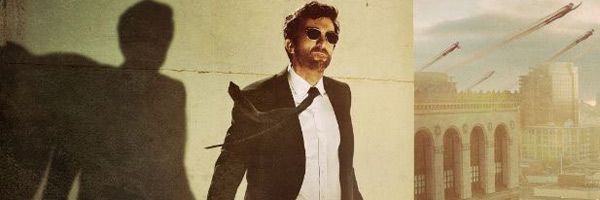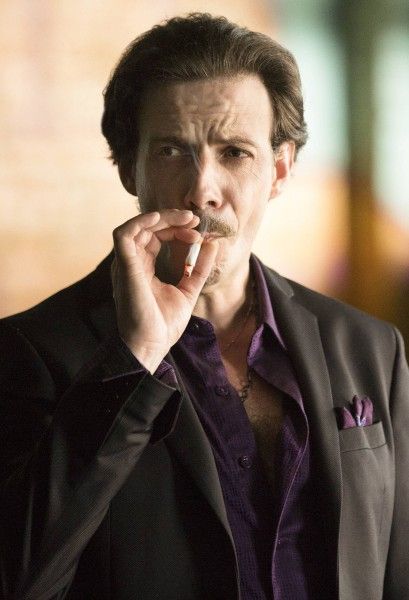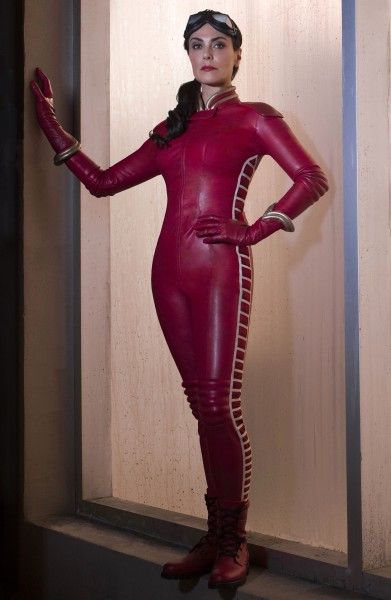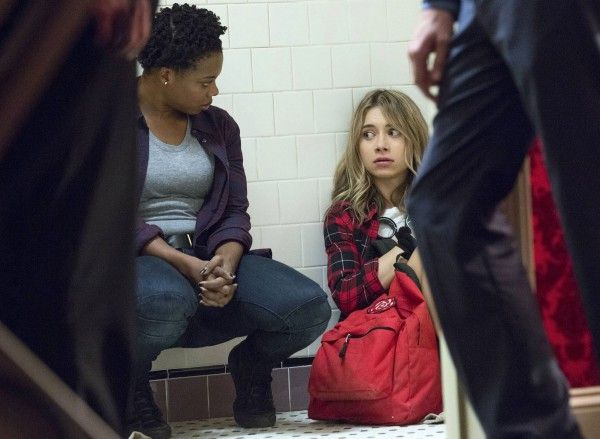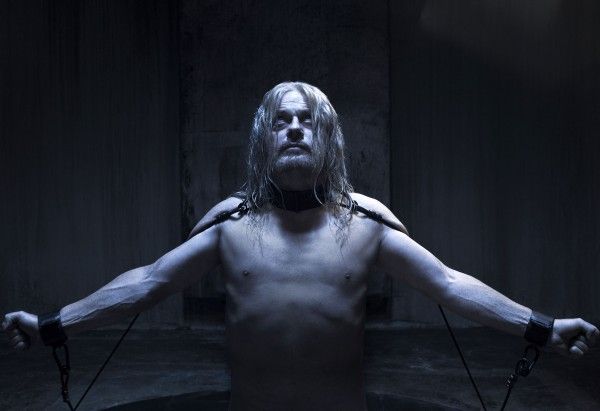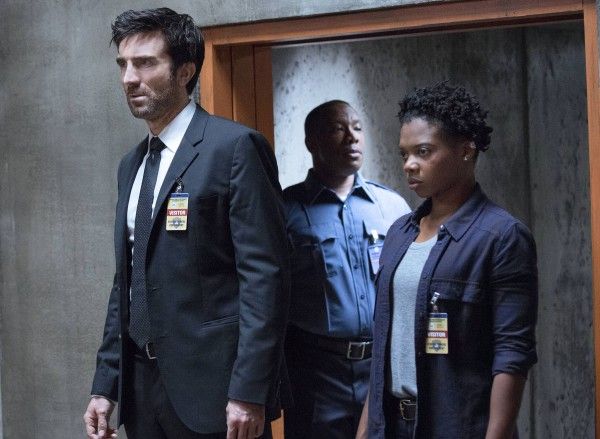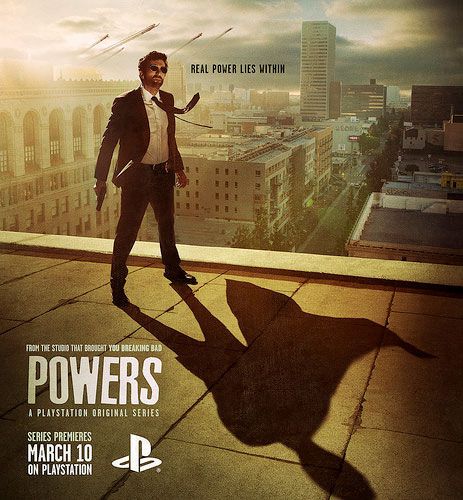Inspired by the graphic novel series of the same name, Powers follows the lives of two homicide detectives, Christian Walker (Sharlto Copley) and Deena Pilgrim (Susan Heyward), who are assigned to investigate crimes involving people with extraordinary abilities, called “Powers.” It is a world full of superheroes who aren’t actually heroic and who use their powers as an excuse for mischief, mayhem, murder and endorsement deals, while today’s paparazzi culture eats up every second of it.
During this exclusive phone interview with Collider, executive producer/comic co-creator Brian Michael Bendis talked about why he wanted to be involved with the TV adaptation, how close they got in the past to actually getting a show made, how different the original FX version was, that they really just needed the time it’s taken to be able to make this the show it was meant to be, how true they’re being to the source material, the importance of the actors embodying the essence of their characters instead of looking exactly like the comic artwork, and how exciting it is to tell a very unique character arc on television. Be aware that there are some spoilers.
Collider: This comic is clearly a passion project for you. Were you ever nervous about handing it over to people who would inevitably have to change some things, in adapting it as a TV show?
BRIAN MICHAEL BENDIS: There’s a lot of different roads that comic creators can go down. You can sign it away and never look at it again, and hope for the best and hold your hands up about it. You can not sign it over. Or you can involve yourself at the level that you think you would be helpful, and that was always my philosophy. I wanted to be there and help, much like Robert Kirkman did with The Walking Dead. That was the right choice for us. I looked at Tank Girl, which is the coolest comic, ever. The movie didn’t make the comic book any less cool. The comic is still the comic. I needed a worst case scenario, so I looked at that, but I wasn’t worried about it too much. The experience of trying was something I really wanted to do. We know we can make the book, so I wanted to go into some uncharted territory to see what it felt like. And after this long journey, it’s really nice that we have a show at the end of it. There were times that it didn’t look like we were going to, so I’m very happy that it ended with a show.
You stuck with trying to get Powers turned into a TV show for much longer than many other people might have had the patience to do.
BENDIS: I’ve gotta give Sony a lot of credit. Sony optioned us when the second issue came out, which was back in 2000, and they stuck with us, the whole time, through all the ups and downs. They never let it go. They always had a plan, and they tried completely different things. It’s our baby. It’s not unlike raising a child. I’ll never get sick of raising my children, but other people might get sick of them. For that, I’ve gotta give Sony all the credit in the world.
How many times, over the years, did you get close enough that you thought a TV show was actually going to happen?
BENDIS: Oh, you mean when we filmed the pilot a couple of years ago, with a whole different cast? Yeah, I thought maybe we were on the road with a network (FX) that never passes on their pilots. And then, when they put the writers’ room together for the season, I thought we were going to go. The truth is that it’s a very hard adaptation. The book is a very specific flipping over of all the rules of the superhero genre, from a very specific point of view. And it’s a cop show, it’s not a superhero show. Even that aspect, some people have a hard time wrapping their heads around. This is a cop show with a unique world and a unique perspective. It’s rated R. It’s a little feisty and a little mobby. All of those things could go horrible wrong, in the wrong hands. Even the original pilot was not a bad pilot. It was good enough that they put a writers’ room together. That’s where we discovered Charlie Huston. He was part of the writers’ room, and he actually wrote the best episode of that version, to the point where Charlie was put in charge. Everything to its place. If it wasn’t for all the struggles before the pilot, we wouldn’t have gotten there. If it wasn’t for the pilot, we wouldn’t have found Charlie.
Two things happened. Number one, in all the time we were struggling to make it, the mainstream audience didn’t know the rules of superheroes like they do now. The comic book audience that bought Powers as a comic book knew what we were doing, but the mainstream audience had not seen Superman, Batman, X-Men, The Avengers and Guardians of the Galaxy, and now they have. Whether they know it or not, they do know the rules of superheros and there will be a part of that audience that’s looking for a new flavor. That’s what Powers is. So, we needed the time to go by, to get that audience up for trying something like this. It all worked out for the best. Also, streaming did not exist. We needed the home that fit and we needed the audience ready, and maybe we got there.
How different is this version to that FX version?
BENDIS: They’re very different, but they have the same characters. The biggest problem that the original pilot had was a chemistry issue. It wasn’t a failure. Some pilots are just [not good]. This one was good enough where they actually put a writers’ room together to work on the season. It was right there, on the bubble of working or not working.
Is this version as close to what you hoped it would be, if a TV show were to actually happen?
BENDIS: Oh, yeah, and we needed the time to make that happen. There are elements of the show that I think are better than the comic. I would never redo the comic because that’s always a bad idea, and it’s stuff that we won awards for, so I don’t want to be a dick about it. Because I have issues with it doesn’t mean anybody else does. Now, I get the best of both worlds.
How true are you being to the source material?
BENDIS: The stuff that happens in the first episode is stuff that happens somewhere in the book, in some version. Charlie did a very excellent job, cherry-picking elements from the book that would make the best show. My number one bugaboo was that I didn’t want it to be this word-for-word faithful adaptation because those can be very flat. That very rarely works. Whereas, if you look at the first Iron Man movie – and those are movies that I consult on, so I get to watch from a very good seat – that’s not actually based on anything, but it feels like Iron Man. The elements are there and it really pops. It makes the most out of its medium, and I wanted to make sure that Powers made the most of its medium. Spiritually, it’s extremely faithful. All of the elements are very faithful, and I’m very happy about that.
Was it always more important to you that the actors that were chosen for these roles really embodied the essence of their characters, instead of just looking exactly the way they were drawn?
BENDIS: Mike [Avon Oeming] has got a really personal, fantastic style that’s very cartoony. If people actually walked in the room who looked like that, you’d be horrified. So, when people would say, “We have to find someone who looks just like Walker,” no one on the planet looks like Walker. You have to find someone who spiritually feels like Walker, and that’s what we did. That, I’m very happy about. I think we were very successful with that.
You have such a great cast for this show, and Sharlto Copley was such an interesting choice for Christian Walker. How does his approach both differ and remain close to the character?
BENDIS: The books are the books, and a lot of the stuff is some version of your id or your ego. What I was excited about, and you see it particularly in the second half of the season, was when the actors really find levels of their characters and really embody them. I wanted the characters to become their own thing and do their own stuff and become a deep part of the actor, their energy and their experience in the world. All of that came forward at just the right time in the season.
We’re used to seeing stories about ordinary people who become extraordinary and have to learn how to deal with their new abilities, but this is essentially the reverse of that, with someone who used to be extraordinary having to learn how to be ordinary. How does that really affect the story you’re telling, as a whole?
BENDIS: That’s a big part of the reason we do the book. Walker’s journey is very unique. It’s a giant fall from grace. He was up there with them. He was in the A-crowd. Years and years ago, I read an article about Sean Young, the actress, and she had mentioned that once you’ve been in and left the VIP section, being let back in is really hard, and much harder than you think it would be. The VIP section is that you can physically fly up there. If you can’t, you physically can’t get up there, but you know it’s there and you know how cool it is. Also, dealing with not having the powers anymore feels like a missing limb. His body still thinks he can do it, but he can’t. So, it’s a bummer, but at the same time, he has to figure it out. And whether he realizes it or not, he’s put himself in the position to speak for those who cannot speak for themselves, and some of them are old acquaintances. He’s in a position to be a better friend to them now, than he ever was. He’s just gotta find that. That’s exciting because, in the large landscape of television, a very unique character arc can take place. Who can ask for anything more?
Powers is available in the PlayStation Store, and free to PlayStation Plus subscribers.

